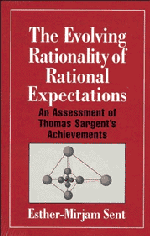7 - Conclusion
Published online by Cambridge University Press: 18 December 2009
Summary
The Conclusion, in Which Nothing Is Concluded
Samuel Johnson, The History of Rasselas,
Chapter XLIXDifferent people give different twists to the rise of rational expectations economics. Even one of the individual contributors, Sargent, entertained different interpretations of rational expectations in different periods. How can I offer a short conclusion in the face of this pluralism? My answer is to try to tie some of the loose ends together here by summarizing the argument, discussing the framework, and giving some suggestions for further research.
Summary
In terms of its content, the book comprises four case studies of how Sargent tried to satisfy his interest in conceptual integrity of neoclassical economic theory and econometrics during different historical periods. The first, Accommodating Randomness, is staged in the late 1960s to early 1970s. The second case study, Accommodating Prediction, takes place in the late 1970s to early 1980s. The third, Accommodating Symmetry, is set in the early to mid-1980s. The last, Accommodating Learning, takes place in the late 1980s to early 1990s. I should acknowledge that though chronology is used as a general ordering principle throughout this book, Sargent has sometimes gone back and forth between different justifications and interpretations of rational expectations during these different periods. Keeping this in mind, let me summarize the four case studies.
Sargent's community in the late 1960s to early 1970s consisted of his thesis adviser Meyer, his colleague Roll, and his student Blattberg.
- Type
- Chapter
- Information
- The Evolving Rationality of Rational ExpectationsAn Assessment of Thomas Sargent's Achievements, pp. 179 - 185Publisher: Cambridge University PressPrint publication year: 1998



